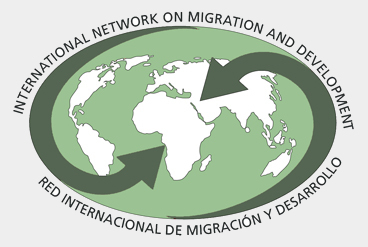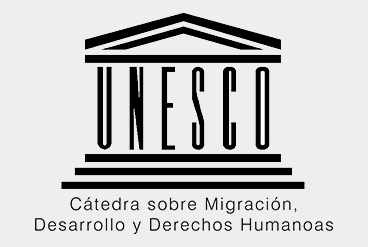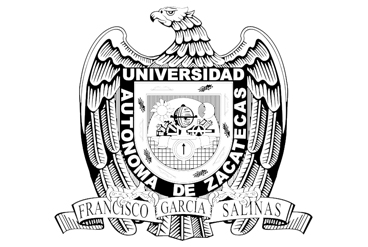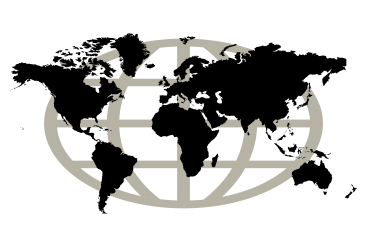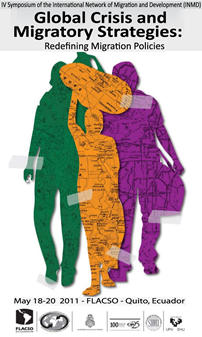
Room 1 . Remittances and Economic Development
Well-being and international remittances in rural Mexican homes, Rafael G. Reyes Morales y Alicia S. Gijón Cruz. Instituto Tecnológico de Oaxaca (ITO) y Universidad Autónoma Benito Juárez de Oaxaca (UABJO). Mexico
The impact of international migration and remittances on the enterprising initiative and the working generation in rural Ecuador, Christian Vasco, Universidad de Kassel, Germany
Remittances, poverty and inequality: the case of Ecuador, Juan Ponce, Mercedes Onofa y Lilian Olivé, FLACSO Ecuador
Global Financial Crisis, Remittances from International Migration, and Livelihood Security in Nepal, Beatrice Knerr, University of Kassel, Germany
Moderator: Abelardo Morales, FLACSO Costa Rica
Room 2 . Security, Securitization and Human Rights
Human trafficking as an "abusive form of migration": securitization of the immigration debate and criminalization of the migrant, María José Magliano y Janneth Clavijo, Universidad Nacional de Córdoba, Argentina
Poland: Production of Irregular Migrants through Misguided Migration Policy and Ineffective Use of Regularisation as a Tool in Migration Management, Alan Desmond, Law Faculty - University College Cork (UCC), Ireland
From the "institutional production of irregularity" to "post-facto irregularity": ten years of migration policies in Spain, Gabriel Echeverría, Instituto Universitario de Investigación Ortega y Gasset, Spain
Mexican Border Governementalities Since 9/11 And The War On Organized Crime. Marianne Marchand, Universidad de las Américas, Puebla, México
Moderator: Luin Goldring, York University, Canadá
Room 3. Migrant Organizations, Movements and Political Participation
From the bowels of the clubs: A study of the associative migrant model, Lenin Priego, Instituto Mora, Mexico
A breath of new life before saying goodbye: the social and transnational movement of former farm laborers from 1942 to 1964 from Michoacán, Mexico, Philippe Schaffhauser Mizzi, Centro de Estudios Rurales, Michoacán, Mexico
Transnational suffrage, the Latin American experience of voting from the exterior and the foreign vote, Gustavo Ernesto Emmerich y Xiomara Peraza Torres, Universidad Autónoma Metropolitana - Iztapalapa, Argentina
Migrants and the struggle for rights: possibilities and limitations of the articulation between organizations, Sergio Caggiano, Consejo Nacional de Ingestigaciones Científicas y Técnicas (CONICET) - Instituto de Desarrollo Económico y Social (IDES), Argentina
The construction of bi-national citizenship for political impact: the case of Mexican society and the migrant as a political actor, Brenda Valdes, Iniciativa Ciudadana, Mexico
Moderator: Alicia Torres, FLACSO Ecuador
Room 4. Return Experiences
The importance of transnational social networks for the return and re-insertion in the migratory process of Ecuadorian migrants, Christian Schramm, Institute for Latin American Studies, Freie Universität Berlin, Germany
Occupational mobility of returning Mexican migrants, Salvador Cobo, Centro de Estudios Migratorios del Instituto Nacional de Migración (INM- Mexico)
To return of to stay? Dilemmas surrounding staying or returning among the Ecuadorian population in Spain, Juan Peris, Erika Masanet Ripoll y Susana López, Instituto Universitário de Lisboa (ISCTE-IUL), Centro de Investigação e Estudos de Sociologia (CIES-IUL), Portugal / Ecuador
Leaving to return - returning to go back again: Agricultural sustenance and social mobility under the impact of globalization in the Austro area of Ecuador, Barbara Grunenfelder-Elliker, FLACSO Ecuador
Moderator: Liliana Rivera, Centro Regional de Investigaciones Multidisciplinarias de la Universidad Nacional Autónoma de México
Room 5. Human Rights, Citizenship and Migration
Forced migration in Latin America, reviewing contexts and notions, Martha Inés Villa, Corporación Región, Colombia
Human rights and conflict in migration: the need for recognition, Ariadna Estevez, UNAM, Mexico
The person in "judicial limbo": neither deportable nor able to become legalized in Spain, Adriana Jarrín, Universidad Autónoma de Barcelona, Spain
Ideological battles: violence, subjectivity and state justice in the era of neoliberal fragmentation, Yerko Castro, Universidad Iberoamericana, Mexico
Citizenship and rights: a reflection on the experience of in-transit migration, Patricia Zamudio, Centro de Investigaciones y Estudios Superiores en Antropología Social, Unidad Golfo, Mexico
Moderator: Jorge Rojas, CODHES, Colombia
Room 6. Women in Migration: Practices, Representations and Subjectivities
"I wanted to see more of the world": Infant migration seen through the eyes of Peruvian girls and boys in Barcelona and Santiago de Chile, Iskra Pavez Soto, Universidad Autónoma de Barcelona, Spain
Discursive constructions around feminine migration and transnational maternity in Bolivia, Fabiana Chirino, Universidad Autónoma “Gabriel René Moreno” —Santa Cruz, Bolivia
Central American women migrants and sex workers on the southern Mexican border as reflected in the contemporary debate on prostitution and transnational migration, Laura Beatriz Aguirre, Instituto de Estudios Latinoamericanos de la Universidad Libre de Berlín, Germany
Moderator: Diana Santos, FLACSO Ecuador
Room 7 . The Global Crisis and its Impact on International Migrations
The world crisis and the exhaustion of the model of population exportation and collection of family remittances in El Salvador. Is a new development strategy viable?, Oscar Guillermo Morales Barahona, Universidad de El Salvador, El Salvador
Return migration in Morocco: economic impact on the development local, Mohammed Khachani, Asociación Marroquí de Estudios e Investigaciones sobre la inmigración, Universidad Mohammed V Agdal Rabat, Morocco
The reconfiguration of international migratory processes and its role in family strategies in Mexico, Ana Jardón, El Colegio de Michoacán, Mexico
Dynamics of Mobility of International Traders in Nigeria: Economic Crisis, Globalization and Visa Situation. Adejumoke Afolayan, CEPACS, University of Ibadan, Nigeria
Feminized migrations to sustain an unsustainable model of cities (and development), Mar García y Amaia Pérez Orozco, ONU Mujeres
Moderator: Fernando Lozano, CRIM-UNAM, México
Room 8 . Regional Policies and Migration
Benefits for all? Crisis, development and governability in the Ibero-American political agenda on immigration, Silvana Santi, Universidad Nacional de Córdoba, Argentina
The process of internationalization of the Agreement on Residence in the Mercosur: an evaluation of the commitment of six states to create an area for free residence and work, Thomas Muñoz, Facultad de Ciencias Políticas y Sociales –UNAM, Mexico
Regional agreements and migration: from cooperation of developed states regarding migration and security to the lack of consensus regarding expansion of the human rights of immigrants, Nuty Cárdenas Alaminos, UNAM, Mexico
Challenges of the Divide Between Immigration and Emigration Policy: Compulsions of Sovereignty or Crisis of Governance? Perveen Kumar, Jawaharlal Nehru University, India
Migration in the context of the processes of Latin American and Caribbean integration, Miriam Rodriguez, Universidad de La Habana, Cuba
br> Moderator: María Isabel Moncayo, FLACSO Ecuador
Room 9 . Migration, Spirituality, Parties and Religion
When migrants bring their devotions with them: popular Bolivian and Peruvian religions in urban territories, from Buenos Aires to Madrid, Susana Sassone, Consejo Nacional de Investigaciones Científicas y Técnicas, CONICET, Argentina
Migration, identity and religiosity in Sisid, Cañar Province, Ecuador, José Antonio Duchi Zaruma, Unidad Educativa Intercultural Bilingüe, Cañar, Ecuador
Religious changes in migratory contexts. Some methodological challenges in the analysis of the relationship between religious diversity and international migration, Liliana Rivera, Olga Odgers y Alberto Hernández, Centro Regional de Investigaciones Multidisciplinarias de la UNAM y El Colegio de la Frontera Norte, México
Parties and migration, Patricia Arias, Universidad de Guadalajara, Mexico
Moderator: Yolanda Alfaro, FLACSO Ecuador
Room 10. Climate Change, Environmental Deterioration and New Migratory Processes
Migration flows in Mexico and their sensitivity to climate change, Kerstin Schmidt-Verkerk, Sussex University, England
Migration and climate change from a regional perspective: the case of Puebla, Miguel Ángel Corona y Benjamín Ortiz Espejel, Universidad Iberoamericana- Puebla, Mexico
Environmentally Displaced People and Migration Policies in the 21st Century. Carolina Abreu Batista, Universidade de São Paulo (USP), Brasil
Environmental migration, vulnerability and gender in Mexico: the case of migrant peasants in the state of Morelos, Adriana Estrada y Úrsula Oswald, CRIM-UNAM – Mexico
Moderator: Pablo de la Vega, Centro de Documentación en Derechos Humanos Segundo Montes, Ecuador
Room 11. Transnational Families and Caretakers
Relationships in the care of the sons and daughters of migrants in the country of departure. The case of Columbia, Amparo Micolta León, Universidad del Valle, Columbia
Transnational maternities: care and affection mediated through the technologies of information and communication, María Carmen Peñaranda, Universidad Autónoma de Barcelona, Spain
The chains that bind. Female migration and family reconfiguration in Cochabamba, Isabel Yépez, Carmen Ledo y Mirko Marzadro, Universidad Católica de Lovaina, Universidad San Simón y Università IUAV de Venecia, Belgium-Bolivia-Italy
Migration and caretakers in the Southern Cone: the case of the chain of caretakers between Paraguay and Argentina, Norma Sanchís y Corina Rodríguez Enríquez, Asociación Lola Mora, CONICET y CIEPP, Argentina
Moderator: Mar García, ONU Mujeres
Room 12. Migrations and State Policies
Migratory governability in Argentina: a critique of the policies of control with a "human face", Eduardo Domenech, Universidad Nacional de Córdoba, Argentina
Law and migration policy in Chile: ambivalence in the comprehension of migrants, Carolina Stefoni Espinoza, Universidad Alberto Hurtado, Chile
The construction of emigration policies in the Ecuadorian state: the case of "Ecuadorian Homes" in the exterior, William Herrera, Universidad Paris I Panthéon-Sorbonne, France
A contribution to transnational debate: the transmigrant public policy of the destination countries, Elena Sanchez Montinajo, GRITIM-Universitat Pompeu Fabra y CIDOB, Spain
Migration, governance and governability: reflections on the scale, place and the spaces of migrants in the political sphere, Cristobal Mendoza, Universidad Autónoma- Iztapalapa, Mexico
Moderator: María Mercedes Eguiguren, Universidad Católica de Lovaina, Bélgica
Room 13. The Socio-Cultural Impact of Migrations
LCanadian temporary migration programs: a socio-cultural perspective, James Restrepo, Universidad de Western Ontario, Canada
Culture and identity in the communities of origin of migrants: Ocampo, Guanajuato, Mexico, Brigitte Lamy Archambault , Universidad de Guanajuato, Mexico
Positive experiences in Central American migration in route through Mexico in the localities of Veracruz, Tabasco and the State of Mexico, Mariana Flores Castillo, Universidad Nacional Autónoma de Mexico
Moderator: Diego Cando, FLACSO Ecuador
Room 14 . Policies of Returning
Migration and return to Ecuador: Between political discourse and State policy, María Isabel Moncayo, FLACSO Ecuador
Voluntary and forced return of migrants in the context of the economic crisis and the common migration policy of the European Union, Francisco Durán, Universidad de Granada, Spain
Motivations for return migration. What are the implications for development?, Carlos Nieto, Universidad Católica de Lovain- La Neuve, Belgium
From the relative absence to growing presence: Return migration in the Andean Region setting. The cases of Peru and Ecuador, Lorena Izaguirre, Pontificia Universidad Católica del Peru
Moderator: Jacques Ramírez, IAEN, Ecuador
Room 15 . Migration and Local Politics
Migration policy in San Francisco, California: political participation of migrants in local spaces, Paola Suarez Ávila, Centro de Investigaciones y Estudios Superiores de Antropología Social (CIESAS, DF) Mexico
Practices and discourses of co-development: the (re)functionalization of transnational links. The case of the high valley of Cochabamba-Bolivia, Yolanda Alfaro, FLACSO Ecuador
Differentiated impacts of the global crisis and its impact on local spaces: approaches from the study of Bolivian and Ecuadorian migration in Spain, Pilar Cruz, Universidad de Sevilla, Spain
Circular labor migration in Spain, the Columbian case: impact on communities of origin, Marta Carballo, Instituto Universitario Desarrollo y Cooperación, IUDC-UCM, Spain
The impact of the global economic crisis on the Hatun Cañar territory, Miguel Canguana, Unidad Educativa Intercultural Bilingüe Sisid, Ecuador
Moderator: Glenda Yager, Casa de la Movilidad Humana, Ecuador
Room 16 . Migratory Labor Management and Human Rights (ILO)
Migratory labor management in Spain, María Dolores Hernandez, Embajada de España en Ecuador, Spain
Migratory labor management: a challenge for the governance of the Andean region. An analysis from policy style and focus on networks, Carla Tamagno, OIT MIGRANDINA
Migratory labor management in Columbia: in search of the lost direction, William Mejía, Red Alma Mater, Universidad Tecnológica de Pereira, Columbia
Global economic crisis and opportunities of skilled migration, Jorge Martinez Pizarro, CELADE
Towards the construction of an information system on migrant labor: the role of academic networks, Norma Velasquez, Universidad Católica Sede Sapientiae, Peru
Moderator: José Luis Ibañez, OIT
Room 17 . Youth, Children and Migration
Fenster, Haus, Heimweg: the school experiences of the children of (Ecuadorian) migrants in Germany, María Fernanda Moscoso, Freie Universität Berlin, Germany
From the point of view of those who stay: constructions of reason for children of migrants regarding life experiences with fathers and/or mothers at a distance, Cynthia Viridiana García Martigñon, UNAM, Mexico
Youth in la Carpio: Segregation and ways of life in a transnational community, Jorge Daniel Vásquez, Universidad de La Salle, Costa Rica
Citizenship from the perspective of young children of Mexican migrants in the United States: the role of formal spaces and non-formal spaces in the processes of citizenship formation, Alfonso Cruz y María Teresa Yurén, Universidad Autónoma del Estado de Morelos, Mexico
Moderator: Berenice Cordero, UNICEF
Room 18. Transformations in the Migratory Trajectories of Latin America
¿A papá mono con bananas verdes? A comparative analysis of labor trajectories of Argentine migrants in times of crisis, Luciana Gandini, El Colegio de Mexico
Crossing the Atlantic in Search of New Destinations: Contemporary African Migration to Latin America. Luisa Feline Freier, London School of Economics and Political Science (LSE), Inglaterra
From Disney to Chavez: Venezuelan Migrants in the U.S. Lourdes Gouveia, Rogelio Saenz y Jasney Cogua, University of Nebraska, Estados Unidos
The cyclical Bolivian return: an arcane model as input for actual reflection on the migration and development debate, Leonardo de la Torre, Cancillería del Estado Plurinacional de Bolivia
The migratory phenomenon of Mexicans in the United States through three historic eras in Mexico: 1810, 1910 and 2010, Adolfo Laborde, Revista Foreign Policy, Edición Mexicana, Mexico
Moderator: Ruben Puentes, Red Internacional de Migración y Desarrollo, Uruguay
Room 19. Analysis of Projects, Policies and Attention for Migrants
Structure, function and models of attention of the civil support organizations for migrants on the northern border of Mexico, José Ascención Moreno Mena, Margarita Barajas y Leticia Figueroa, Universidad Autónoma de Baja California, Mexico
Results of the project: young construction workers from El Salvador, all for one and one for all, Katharine Andrade Eekhoff, Catholic Relief Services, San Salvador, El Salvador, Unites States
International migrations and the education processes in Guatemala: reflections on an inter-institutional and inter-sectorial management scheme, Irene Palma, INCEDES, Guatemala
The United States health system and reproductive health of migrants, Miguel Moctezuma, Universidad Autónoma de Zacatecas, Mexico
Moderator: Mario Cadena, Secretaría Nacional del Migrante de Ecuador
Room 20 . Migration, Identities and Ethnicities
Territorial identity as a criterion of social hierarchy and mechanism legitimization of territorial control practices. Immigrants and natives in Santa Cruz, southern Patagonia Argentina, Laura Rincón, Universidad Externado de Colombia, Columbia
Peruvian immigrants in Chile. Comprehension of the migratory project from the aspirations of the immigrants, Grace Silva, Universidad de Concepción de Chile
Anthropology and migration. Four contributions to understand AMCO emigration (Columbia), Gregorio Hernandez Pulgarín, Grupo de Investigación Territorialidades-Universidad de Caldas, Columbia
Transnationalization of indigenous spirituality and mystical tourism, Jean Paul Sarrazin, Universidad de Poitiers, France
Moderator: Lourdes Gouveia, University of Nebraska, Estados Unidos
Principal panels
Adriana Piscitelli, UNICAMP, Brasil . Economic, Sexual and Emotional Exchanges in Transnational Brazilian Sex Market
Fernando Lozano, CRIM UNAM, Mexico. Skilled migration and human development in Latin America and the Caribbean
Maria Eugenia Anguiano, Colegio de la Frontera, Mexico From National borders to regional borders: the actions and policies containment in three countries of transit migration
Sandra Gil, CONICET, Argentina. MInternational Migration, Security and Development in European Union Migration Policies of (or how to advance the frontiers of Europe)
